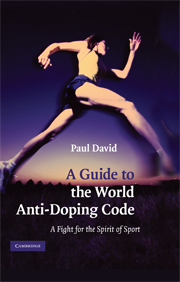Book contents
- Frontmatter
- Contents
- List of figures
- Table of cases
- Introduction
- 1 The development of principles relating to anti-doping regimes: the role of the Court of Arbitration for Sport
- 2 Overview of the Code and the World Anti-Doping Program
- 3 The International Standards in more detail
- 4 The nature of the Code and its interpretation and application
- 5 Articles 1 and 2 of the Code: anti-doping rule violations under the Code
- 6 Article 3 of the Code: the proof of anti-doping rule violations under the Code
- 7 Responsibility for testing and investigations, results management and hearings
- 8 Sanctions for anti-doping rule violations: Articles 9 and 10 of the Code
- 9 Article 13: appeals under the Code
- 10 Challenges to the Code in the courts
- 11 The way ahead: the 2009 Code
- Index
3 - The International Standards in more detail
Published online by Cambridge University Press: 24 June 2009
- Frontmatter
- Contents
- List of figures
- Table of cases
- Introduction
- 1 The development of principles relating to anti-doping regimes: the role of the Court of Arbitration for Sport
- 2 Overview of the Code and the World Anti-Doping Program
- 3 The International Standards in more detail
- 4 The nature of the Code and its interpretation and application
- 5 Articles 1 and 2 of the Code: anti-doping rule violations under the Code
- 6 Article 3 of the Code: the proof of anti-doping rule violations under the Code
- 7 Responsibility for testing and investigations, results management and hearings
- 8 Sanctions for anti-doping rule violations: Articles 9 and 10 of the Code
- 9 Article 13: appeals under the Code
- 10 Challenges to the Code in the courts
- 11 The way ahead: the 2009 Code
- Index
Summary
The role of International Standards
The Code functions together with the WADA International Standards and various Guidelines or Models of Best Practice which may be adopted by anti-doping organisations, in relation to the processes under the Standards. The Guidelines are not mandatory, whereas Signatories must apply and comply with the International Standards in order to fulfil their obligations. The Standards are an important part of the agreed regime under the Code, and the Articles of the Code make direct reference to them where testing, the analysis of samples to establish doping, the designation of prohibited substances and methods and the grant of therapeutic use exemptions are referred to. In these areas, the Code provides the framework, while the Standards provide the detail. An anti-doping organisation which agrees to the Code, and an athlete or other person who is bound to it, will agree to the application of both the Code and the Standards. Often, a challenge to an alleged anti-doping violation will involve the detailed consideration of the Standards (and related technical documents concerning such matters as the method of analysing samples for specific prohibited substances or methods) applicable to the process of testing and analysis, in order to determine whether the anti-doping organisation has carried out its obligations properly.
The International Standards are:
the Prohibited List 2008;
the International Standard for Therapeutic Use Exemptions;
the International Standard for Testing; and
the International Standard for Laboratories.
- Type
- Chapter
- Information
- A Guide to the World Anti-Doping CodeA Fight for the Spirit of Sport, pp. 53 - 82Publisher: Cambridge University PressPrint publication year: 2008



